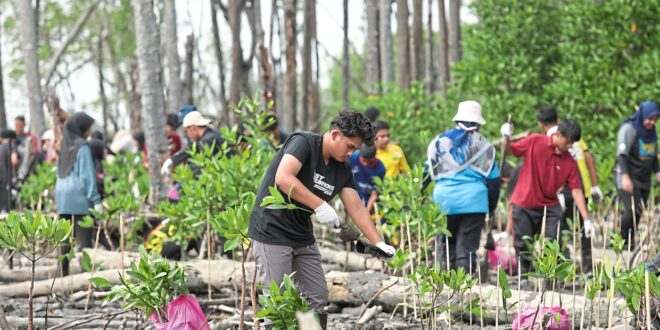Severely damaged following an oil spill four years ago, the mangrove thickets at Tanjung Tuan Recreational Forest are set to thrive again, thanks to a reforestation effort by MBSB Group.
Employees from the organisation, joined by 80 students from Politeknik Port Dickson (PPD) as well as volunteers from the Malaysian Nature Society (MNS) and Melaka Forestry Department staff, spent a Saturday morning planting 1,000 mangrove propagules along the stretch.
This is the third spot in the country where MBSB Group planted mangroves this year, after having done so in Sabak Bernam in Selangor and Setiu in Terengganu.
Similar programmes will also be carried out in Tuaran (Sabah), Tanjung Piai (Johor) and Nibong Tebal (Penang) in the coming months.
MBSB Group chief syariah and sustainability officer Ashraf Gomma Ali said, “Sustainability is a major part of our strategies.”
Ashraf said MBSB Group decided on this activity as mangroves were among some of the most effective plants that could absorb carbon dioxide and counter global warming effects.
“This also helps support bio-diversity as mangroves are also endangered.”
He said the programme to preserve ecosystems was part of MBSB Group’s corporate social responsibility initiative too.
“Also, in the Islamic tradition, the act of planting trees is a great expression of hope and selflessness.”
MBSB Group, he added, was also involved in several other CSR initiatives such as supporting orphanages, asnaf (hardcore poor) through zakat collections, helping entrepreneurs by providing them grants to start businesses as well as providing them with training.
MNS senior marketing manager Mohd Raffi Ismail said there was a pressing need to plant the mangroves as the oil spill had done extensive damage along that stretch.
Ashraf says the company decided on this activity as mangroves can absorb carbon dioxide and counter global warming.
“Many mature trees in the worst affected stretch died instantly while others took a long time to die and the damage is still visible till this day.
“The mangrove forests have not been able to thrive and our aim is to rejuvenate this area,” he said, adding that Forestry Department officers would be assisting in the effort.
Mohd Raffi said MNS had carried out a similar planting exercise prior to this but the indiscrimate dumping of rubbish, including plastics and polystyrene, had stunted the growth of young trees.
“Rubbish dumped in rivers has found its way along the stretch and this has choked the young mangroves, making it difficult for them to thrive.
“It is our hope that this planting exercise will rejuvenate mangrove life along the stretch,” he said.
Although workers had regularly cleaned up rubbish washed up along the stretch, it was crucial that whatever traces of oil left behind by the spill in 2020, was cleaned up, he added.
PPD Kelanasiswa Malaysia assistant district commissioner Mohamad Zamri Muhamad commended MBSB for the effort, adding that the mangrove-planting exercise would also expose students to the importance of preserving the environment.
Mohamad Zamri, who is also head of the mathematics, science and computer department at the polytechnic, said the programme was also part of the students’ extra-curricular activities.
“This is certainly good exposure for the students who are aged between 18 and 20, as they will learn how and where to plant mangroves and the different species,” he added.
 BeritaKini.biz Berita Viral Terkini di Malaysia
BeritaKini.biz Berita Viral Terkini di Malaysia





